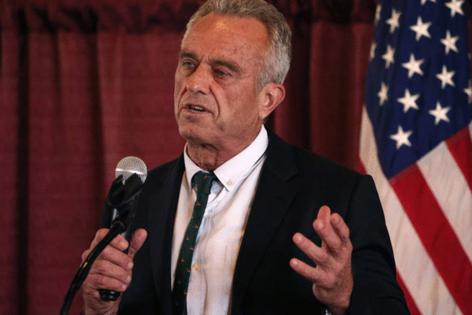Why a Duke professor joined fellow Nobel laureates to oppose RFK Jr.'s DHHS nomination
Published in News & Features
When Dr. Robert Lefkowitz received the Nobel Prize in chemistry in 2012, he used part of his acceptance speech to denounce the “clear anti-science bias” of some candidates who had sought the presidential nomination that year.
“This was manifest as a refusal to accept, for example, the theory of evolution, the existence of global warming, much less of the role of humans in this process, the value of vaccines or of embryonic stem cell research,” Lefkowitz told attendees at the Nobel banquet in Stockholm.
Twelve years later, Lefkowitz is speaking out again — this time about the man whom President-elect Donald Trump has nominated as secretary of the U.S. Department of Health and Human Services.
Lefkowitz, who is a distinguished professor in the Duke University School of Medicine, on Monday joined more than 75 Nobel laureates in signing a letter opposing Trump’s nomination of Robert F. Kennedy Jr. to lead the agency. The New York Times obtained and published the letter that was sent to all 100 members of the U.S. Senate, who are responsible for confirming presidential nominees.
Paul Modrich, a distinguished professor of biochemistry at Duke, also signed the letter but declined to comment on that decision to The News & Observer.
Kennedy, who ran as a third-party candidate in the presidential election before dropping out and endorsing Trump, is a noted anti-vaccine activist who has also promoted conspiracy theories related to medical treatments, food safety and other topics. An attorney, he does not have a professional background in health care or medicine.
In their letter, the Nobel laureates argued that Kennedy has a “lack of credentials or relevant experience” for the DHHS role. They also expressed concerns about the potential consequences of Kennedy leading the agency.
“In view of his record, placing Mr. Kennedy in charge of DHHS would put the public’s health in jeopardy and undermine America’s global leadership in the health sciences, in both the public and commercial sectors,” the letter reads.
Now, like the other laureates who signed on, Lefkowitz will wait to see whether it influences the senators’ opinions — and whether it can help “counter these pernicious anti-scientific trends,” as he asked his fellow laureates to do in their “own small way” in his banquet speech more than a decade ago.
A rare letter
The letter opposing Kennedy’s nomination to lead DHHS is believed to be the first time that Nobel laureates have joined together to oppose a Cabinet nominee, The New York Times reported. But it’s not the first time they have spoken out.
Lefkowitz told The N&O that it’s not unusual for a group of laureates to pen a letter about non-political issues, such as human rights abuses — especially those against scientists. Such letters are typically documented in national and international media.
Lefkowitz said he has signed several of those letters, though he tries not to “dilute” the messages by signing too many.
“Every once in a while, something really speaks to me or seems very egregious,” Lefkowitz said, “and I’ll sign.”
But for the letter opposing Kennedy, the decision was a “no-brainer.” Lefkowitz said he has been “appalled” by several of Trump’s nominations, and Kennedy “is as appalling as any of them.”
“I was thrilled that something was being organized,” Lefkowitz said.
Lefkowitz, who won the Nobel Prize for his research of G-protein-coupled receptors, said he worries specifically about how the availability of vaccines could change under Kennedy, as well as about the possibility of Trump recommending the removal of fluoride from drinking water, as Kennedy told NPR would be the case. Fluoride strengthens teeth and prevents cavities, but is toxic at high levels and has become fodder for fringe health theories.
Such proposals “fly in the face” of scientific research, Lefkowitz said.
Possible impacts of letter
Though he is proud to have signed the letter against Kennedy, Lefkowitz now wonders what its impact will be — and whether it could actually further perpetuate the “anti-scientific trends” that he has long been concerned about.
Instead of encouraging the senators to vote against Kennedy’s confirmation, Lefkowitz said, it could have the opposite effect. He noted that Trump, and the broader Make America Great Again movement he has spearheaded, has included polarizing rhetoric about science and academics — or, in Lefkowitz words, “a total disrespect and disbelief of elites and expertise.”
In a statement to The New York Times, a spokesperson for the Trump transition team said: “Americans are sick and tired of the elites telling them what to do and how to do it. Our healthcare system in this country is broken, Mr. Kennedy will enact President Trump’s agenda to restore the integrity of our healthcare and Make America Healthy Again.”
“Well, could you have more elitism or expertise, than Nobel Prize-winning scientists?” Lefkowitz said. “It’s a good chance the senators will look at this as a bunch of pointy-headed scholars who think they know better than the man in the street.”
He added: “Nothing we can do about that.”
Still, Lefkowitz said he has received more attention from family, friends and colleagues about this letter than any other he has previously signed with the Nobel laureates. That could be a sign that the message is resonating, and that it could make a difference — if not with the senators themselves, then with the broader conversations about science in the political landscape.
“So,” Lefkowitz said, “we shall see what goes on.”
©2024 McClatchy Washington Bureau. Visit mcclatchydc.com. Distributed by Tribune Content Agency, LLC.







Comments